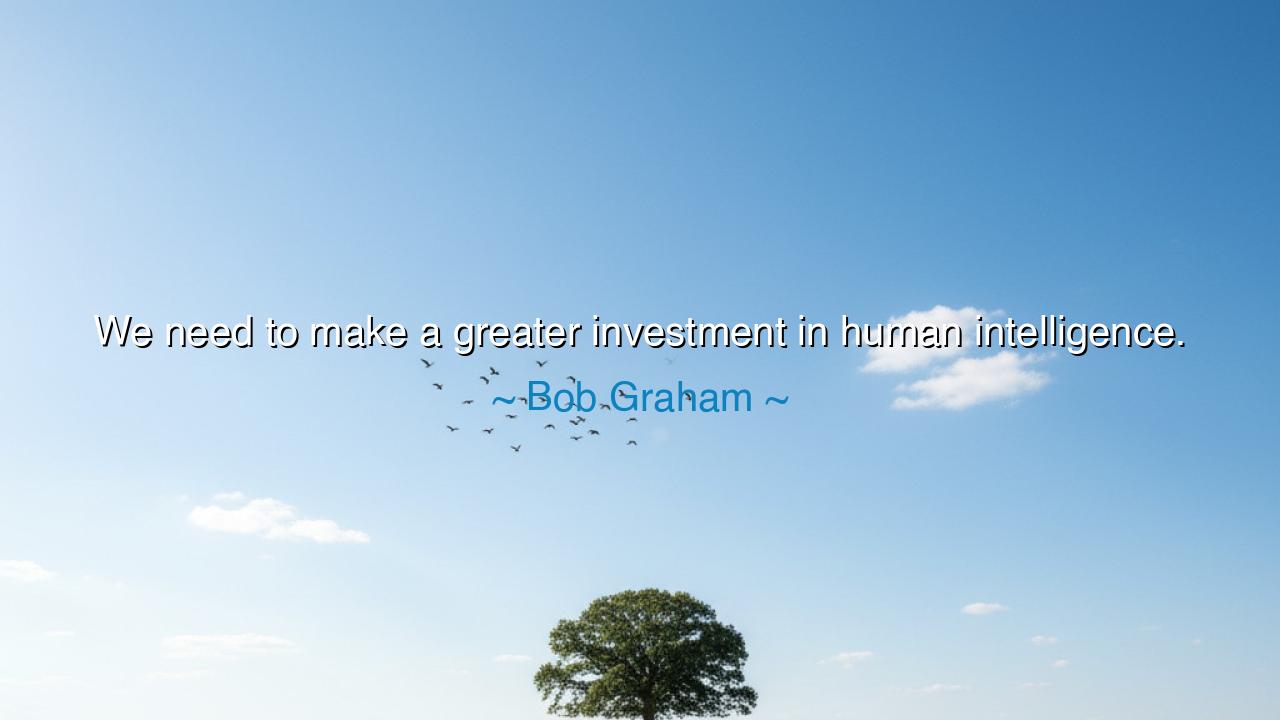
We need to make a greater investment in human intelligence.






In the insightful words of Bob Graham, "We need to make a greater investment in human intelligence," we are reminded of the invaluable importance of investing in the intellectual and creative potential of individuals. Graham’s statement underscores a vital truth: intelligence—not just in terms of raw data, but in its ability to think critically, adapt, and innovate—is the greatest resource a society can nurture. This human intelligence is the bedrock upon which the future of nations, communities, and civilizations rests. It is through learning, understanding, and the application of knowledge that we can solve the great challenges of our time and forge paths to a better future. The call for investment in human intelligence speaks to the need for prioritizing education, research, and intellectual development at all levels of society.
The ancients were well aware of the power and significance of intelligence. The Greeks, in particular, placed great emphasis on the cultivation of the mind. Socrates, perhaps the most revered of the Greek philosophers, believed that the purpose of life was to seek knowledge and wisdom. He famously proclaimed, "The unexamined life is not worth living," implying that the highest form of human existence is to question, learn, and grow intellectually. For Socrates, human intelligence was not just an abstract concept, but a moral duty, as it was through wisdom that one could live a virtuous and meaningful life. Plato, his disciple, further expanded upon this in his works, envisioning a society ruled by philosophers, those with the wisdom to lead. The Greeks understood that the investment in human intelligence was not a luxury, but a necessity for the flourishing of society.
Consider the life of Leonardo da Vinci, who embodied the very principles of intellectual investment. Da Vinci was not just an artist but a scientist, engineer, and inventor, constantly seeking to understand the world around him. His curiosity and relentless pursuit of knowledge were fueled by a deep belief in the power of human intellect. His sketches of flying machines, anatomy, and engineering marvels showed that the investment in learning and the development of intelligence could transcend any singular discipline, allowing one to leave a lasting impact on the world. Da Vinci’s life demonstrates how human intelligence—when nurtured and allowed to flourish—has the capacity to create not just works of art, but revolutionary ideas that shape the course of history.
In more recent history, the investment in human intelligence has led to breakthroughs that have altered the very fabric of society. Albert Einstein, through his exploration of the nature of the universe, opened new realms of understanding with his theory of relativity. His work has had a profound impact on everything from technology to philosophy. But Einstein himself, like Da Vinci, would argue that his greatest discoveries were not achieved in isolation but through a combination of collaboration, education, and an environment that valued intellectual curiosity. Einstein’s life speaks to the power of investing in human intelligence, allowing the pursuit of knowledge to transcend the individual and shape the world in ways unimaginable.
The lesson we can take from Graham’s call for greater investment in human intelligence is profound: the future of our world lies not in material wealth, but in the intellectual development of our people. When societies prioritize education, foster critical thinking, and invest in intellectual pursuits, they lay the foundation for innovation and progress. This investment is not just about creating smarter individuals; it is about building a society capable of solving the greatest challenges humanity faces—whether in medicine, technology, or social justice. Human intelligence, when properly nurtured, holds the key to solving problems that seem insurmountable.
In our own lives, we must recognize that our individual and collective potential is shaped by the investment we make in our minds. This investment comes through education, but also through a lifelong commitment to learning, reflection, and growth. Just as the Greeks valued the pursuit of wisdom, so must we in our modern world. We must seek to create environments where the intellectual and emotional growth of individuals is valued just as highly as financial or physical success. This means supporting our educators, researchers, and thinkers, but it also means fostering environments in our personal lives—at home, at work, and in society—that encourage curiosity, open-mindedness, and creativity.
Furthermore, we must challenge ourselves to contribute to the greater good through our own intellectual investment. Einstein, in his humility, often spoke of the need to serve humanity with the gifts we are given. Leonardo da Vinci never hoarded his insights for personal gain but shared them freely with the world. As individuals and as a collective society, we must ask ourselves how we are investing in the intelligence of the next generation. Are we teaching them not just facts, but how to think critically, how to question, and how to see the world through an expansive lens? Are we creating opportunities for young people to engage with the world in ways that foster creativity and imagination? The path forward is not simply about ensuring our survival, but about creating a world where human intelligence can thrive, evolve, and transform.
By embracing Bob Graham’s message, we are reminded that the future depends on how we nurture the minds of today. The investment in human intelligence is the most valuable investment we can make, not just for our own benefit, but for the benefit of future generations. Let us, then, dedicate ourselves to the cultivation of intellect, to the pursuit of knowledge, and to the creation of a society where intelligence is nurtured, celebrated, and used for the greater good. Only then can we unlock the full potential of humanity and rise to meet the challenges of tomorrow with wisdom and insight.






AAdministratorAdministrator
Welcome, honored guests. Please leave a comment, we will respond soon